|
De Amerikaanse schrijver Robert Coover werd geboren op 4 februari 1932 in Charles City, Iowa. Zie ook alle tags voor Robert Coover op dit blog.
Uit: White-Bread Jesus
“When that bully Cavanaugh rises in the middle of the opening prayer like a self-righteous Sadducee, shouldered round by all his fawning scribes and elders, to silence Reverend Wesley Edwards (was he shouting? of course he was shouting, God is deaf as a stump), neither he nor Jesus is surprised. In fact, they welcome it. Such persecutions are to be expected when what is hidden is revealed, and indeed stand as validation of it. What else is the Easter story about — for Christ’s sake? Who concurs: As they persecuted me, they’ll persecute you. A prophet in his own country, and all that, my son. But rejoice and be glad, your reward is great. His immediate reward is to have to sit beside the pulpit, biting his tongue, staring out on the sad blank faces of his First Presbyterian congregation, while the banker, having skipped ahead in the proceedings to the tithes and offerings, money being all he knows (and power, Cavanaugh knows power), speaks of the general good health of the church finances, its immediate needs (an assistant minister, for example — urgently!), and Easter as a loving family occasion. No, no, you idiot! It is a time of rejection of family, indeed of all earthly connections! Have you no ears? If anyone comes to me and does not hate his own father and mother and wife and children and brothers and sisters, yes, and even his own life, he cannot be my disciple! Leave everything — everything! — and follow me! You ignorant fool! Listen to your own son Tommy’s scripture reading: “But who do you say that I am?” Do you not know? It’s all Wesley can do to stop another noisy eruption from coming on. The indwelling Christ, too, is aboil with indignation, cursing traders and moneychangers and all their abominable progeny. A den of robbers! They are polluting the temple! Drive them out! He’s in a state, they’re both in a state.
It has been a trying couple of weeks. The Passion of Wesley Edwards. He’s not kidding, he’s endured it all in this Passiontide fortnight, from the deathly silence of God and the collapse of his faith, through all the upheavals at home and a plunge into harrowing desolation, a veritable descent into hell, to — finally — a kind of weird convulsive redemption that has left him rattled and confused and not completely in control of himself.”
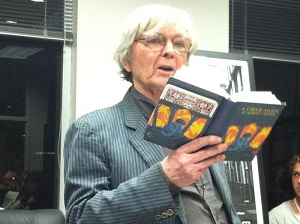
Robert Coover (Charles City, 4 februari 1932)
De Amerikaanse schrijver Stewart O'Nan werd geboren op 4 februari 1961 in Pittsburgh, Pennsylvania. Zie ook alle tags voor Stewart O’Nan op dit blog.
Uit: Snow Angels
“I was in the band the fall my father left, in the second row of trombones, in the middle because I was a freshman. Tuesdays and Wednesdays after school we practiced in the music room, but on Fridays Mr. Chervenick led us outside in our down jackets and tasseled Steeler hats and shitkicker boots and across the footbridge that spanned the interstate to the middle school soccer field, where, like the football team itself, we ran square-outs and curls and a maneuver Mr. Chervenick called an oblique, with which, for the finale of every halftime show, we described—all 122 of us—a whirling funnel approximating our school's nickname, the Golden Tornadoes. We never got it quite right, though every Friday Mr. Chervenick tried to inspire us, scampering across the frost-slicked grass in his chocolate leather coat and kid gloves and cordovans to herd us into formation until—in utter disgust—instead of steering a wayward oboe back on course he would simply arrest him or her by the shoulders so the entire block of winds had to stop, and then the brass and the drums, and we would have to start all over again.
Late one Friday in mid-December we were working on the tornado. Dusk had begun to fill the air and it was snowing, but Saturday was our last home game and Mr. Chervenick persuaded the janitor to turn on the lights. An inch or so had fallen during the day and it was impossible to see the lines. "Wrong, wrong, wrong!" Mr. Chervenick shouted. When the girl pulling the xylophone slipped and twisted her ankle, he blew his whistle three times, which meant we were to line up for a final chastising pep talk before we could leave. He climbed the three steps of his little wheeled podium and let us stand in silence for a minute so we would realize how disappointed he was. Snow piled up in our hair. Beyond the sea of flakes drifting through the high lights came the ringing drone of a tractor-trailer's chains on the interstate. In the valley, muffled by a ceiling of clouds, lay the burning grid of Butler, the black river, the busy mills.
"We have all worked very hard this year," he said, and paused, breathing steam, as if speaking to a stadium, waiting for his words to circle. Beside me Warren Hardesty muttered something—a joke, a rejoinder—and then we heard what I immediately identified (from my own .22, my father's Mossberg, the nightly news from Vietnam) as gunshots.”
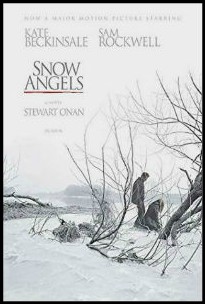
Stewart O'Nan (Pittsburgh, 4 februari 1961)
Cover luisterboek
De Nederlandse dichter en schrijver Louis Ferron werd op 4 februari 1942 geboren in Leiden. Zie ook alle tags voor Louis Ferron op dit blog.
Uit: Karelische nachten
“Waar? In háár bed? Het mijne? Heb ik mij de afgelopen nacht nog op haar gewenteld? Of heeft zij schrijlings op mij plaatsgenomen? Wat had er tussen ons kunnen gebeuren wanneer de wereld vierkant was en duisternis heerste als je het licht aan deed?
Vragen, voortdurend vragen, de ene al zinlozer dan de andere. Kwestie van behoud. Wie niet vraagt zal niet weten. Daartoe dient men ook een encyclopedie in huis te hebben. Om een antwoord op al die vragen te vinden. Waar ligt het Kattegat en wie was August Graf von Platen Hallermünde? En dan dat vlees. Ik bedoel, van die vrouw. Zoveel. Dat kunnen de dekens niet verborgen houden.
Ik heb altijd een voorkeur gehad voor gevulde vrouwen. Of druk ik me hier te actief uit? Is het niet altijd eerder zó geweest...? Het Kattegat, dat weet ik heel zeker, ligt ten oosten van Jutland. En August Graf von Platen Hallermünde was een van die tragische figuren die, hoewel ze de eeuwigheid hebben nagestreefd, niet bestand zijn gebleken tegen het woeden der tijd. Een kwestie van slecht bloed. Daar is geen kruidenthee, geen purgeermiddel tegen gewassen. Platen: aan tyfeuze koortsen gestorven. In Syracuse, ver van zijn geboortegrond. Vlak voor zijn sterven wellicht nog beroofd door een morsige schandknaap, die hem eens trouw tot in de dood had beloofd.
Wer die Schönheit angeschaut mit Augen,
Ist dem Tode schon anheim gegeben...
De schoonheid gezien hebben en dat beeld mee het graf in moeten nemen omdat men te weinig talent heeft die ervaring in een blijvend monument om te zetten...
Zou die vrouw naast me een monument waard zijn? Ik sloot mijn ogen en probeerde me haar gestalte voor de geest te halen. Veel vlees. Maar hoe is het verdeeld over het lichaam? Ik moet gisteravond met haar gedanst hebben, haar in de heupen hebben gegrepen, mijn handen rond haar billen en op haar borsten hebben gelegd.”
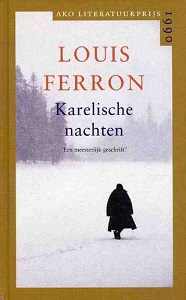
Louis Ferron (4 februari 1942 – 26 augustus 2005)
Cover
De Oostenrijkse toneelschrijver Werner Schwab werd geboren in Graz op 4 februari 1958. Zie ook alle tags voor Werner Schwab op dit blog.
Uit: Die Präsidentinnen
„MARIEDL (unterm Tisch) Ich glaub nicht, daß das recht ist, Erna, mit deiner Sparsamkeit. Deine Sparsamkeit ist viel zu groß und viel zu übertrieben. Der Herrgott will nicht, daß es den guten Menschen schlecht geht.
ERNA (wütend, hebt das Tischtuch) Du hast ein leichtes Reden, meine liebe Mariedl, du warst immer alleine und ohne eine richtige Bindung. Du hast immer herumfahren können in der Welt, wenn du eine Freizeit bekommen hast in deinem Leben. Du warst heuer schon in Lourdes, in Medjugorje und zweimal in Mariazell. Du hast keine Verantwortung für ein abtrünniges Kind.
GRETE Aber der Herrmann ist doch schon ein männlicher Mann.
MARIEDL taucht auf, setzt sich, zuckt ratlos die Schultern und beginnt den Oberkörper rhythmisch nach vor und zurück zu bewegen.
ERNA Ein Mannsbild ist er schon. Die Weiber drehn sich eh alle um nach dem Herrmann, so schamlos wie die sind in der heutigen Zeit. Aber er leugnet ja alles ab, was schön ist im Leben und was einen guten Sinn hat. Da oben, sag ich immer zum Herrmann, da oben kommen einmal die Bilder von meinen Enkerln hin. (Sie zeigt auf zwei weiße, rechteckige Flecken an der Wand.) Aber den Gefallen tut er mir nicht an, der macht mir keine Enkelkinder. Dabei hab ich früher einmal fünf freie Platzerln freigehalten für die Enkelbilder, jetzt hab ich eh schon drei Plätze aufgebraucht für die erste Zeit, damit der Herrmann nicht so geschreckt ist. Dabei könnte er so leicht Verkehr haben in der heutigen Zeit. Heute haben die Menschen ja den ganzen Tag einen Verkehr. Und der Herrmann gibt ja auch zu, daß er immer einen Verkehr haben könnte, aber er hat eben absichtlich nie einen Verkehr, weil so ein Verkehr kann ja eine richtige Schwangerschaft einleiten, und so etwas wäre zusammengezählt unter dem Strich womöglich ein Enkerl.“
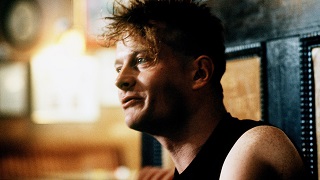
Werner Schwab (4 februari 1958 - 1 januari 1994)
De Duitse schrijver en journalist Norman Ohler werd geboren op 4 februari 1970 in Zweibrücken. Zie ook alle tags voor Norman Ohler op dit blog.
Uit: Blitzed
“Under a clean-swept summer sky stretching over both industrial zones and uniform housing, I take the suburban train south-east, to the edge of Berlin. In order to find the remnants of the Temmler factory I have to get out at Adlershof, which nowadays calls itself 'Germany's most modern technology park'. Avoiding the campus, I strike off across an urban no man's land, skirting dilapidated factory buildings, and passing through a wilderness of crumbling brick and rusty steel. The Temmler factory moved here in 1933. It was only one year later that Albert Mendel (the Jewish co-owner of the Tempelhof Chemicals Factory) was expropriated by the racist laws of the regime and Temmler took over his share, quickly expanding the business. These were good times for the German chemicals industry (or at least for its Aryan members), and pharmaceutical development boomed. Research was tirelessly conducted on new, pioneering substances that would ease the pain of modern humanity or sedate its troubles. Many of the resulting pharmacological innovations shape the way we consume medicine today By now the former Temmler factory in Berlin-Johannisthal has fallen into ruin. There is no sign of its prosperous past, of a time when millions of Pervitin pills a week were being pressed. The grounds lie unused, a dead property. Crossing a deserted car park, I make my way through a wildly overgrown patch of forest and over a wall stuck with broken bits of glass designed to deter intruders. Between ferns and saplings stands the old wooden 'witch's house' of the founder, Theodor Temmler, once the nucleus of the company. Behind dense alder bushes looms a forsaken brick building. A window is broken enough for me to be able to climb through, stumbling into a long dark corridor. Mildew and mould grow from the walls and ceilings. At the end of the hallway a door stands beckoning, half open, encrusted with flaking green paint. Beyond the door, daylight peers through two shattered, lead-framed industrial windows. An abandoned bird's nest hides in the corner. Chipped white tiles reach all the way to the high ceiling, which is furnished with circular air vents.”
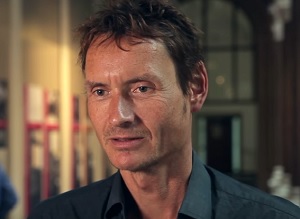
Norman Ohler (Zweibrücken, 4 februari 1970)]
Onafhankelijk van geboortedata
De Nederlandse dichter en theatermaker Luuk Imhann werd geboren in Monster in 1986. Zie ook alle tags voor Luuk Imhann op dit blog.
Uit: Paradijs
“Het laatste lid van de groep, Danuel Milton, is vooral stil. Oud en wijs wil hij overkomen, denk ik, maar hoewel hij met zijn achtenvijftig jaar de oudste is van de expeditie – de rest is niet veel jonger – maakt hij geen wijze indruk. Hij lijkt een groot verdriet met zich mee te dragen en geeft me met norse blikken het gevoel dat ik niet gewenst ben. Ik, de student, die het allemaal toch niet begrijpt. Dat mijn vader de expeditie financiert levert me nog geen voorrangspositie op, lijkt Danuel te willen zeggen.
De anderen zijn een jaar of twintig ouder dan ik en zijn het studentenleven waarin ik me nog begeef al geruime tijd ontgroeid. Allen zien we eruit als oermensen in de jungle die ze voor de grap westerse kleding hebben aangetrokken, zo ongemakkelijk bewegen we ons erin voort. Enige uitzondering, op Osu en Yong na, die geen ongemak kennen of het nooit laten blijken, is Lilith, die rondloopt als een bosnimf; zelfs met doorweekte kleding en een eindeloze stroom zweet over haar uitgeputte gezicht is ze nog beeldschoon. Haar zwarte, lange haren, haar groene ogen, ze lijkt soms op een dolende figuur die je diep het oerwoud in lokt, waarna je je weg niet meer terugvindt.
We stoppen en de biologen pakken hun verrekijkers. Olav legt een hand op mijn schouder en wijst me waar ik moet kijken. ‘Een Aap van de Oude Wereld,’ zegt hij.”
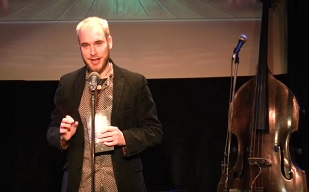
Luuk Imhann (Monster, 1986)
De Nederlandse dichteres Else Kemps werd geboren in Malden in 1995. Zie ook alle tags voor Else Kemps op dit blog.
De logeerbeer
Het is laat als je het uitspreekt: ‘Ik wil het liever geen naam geven.’
Ik herinner me de meester van groep vier, die de klas vroeg of iemand iets kon bedenken dat geen naam had. Ik keek het lokaal rond, naar de logeerbeer waarvan in een kringgesprek was besloten dat iedereen een eigen naam mocht verzinnen. In het bijbehorende dagboek schreven we dingen als ‘in bad geweest met Lola,’ ‘appelcruesli gegeten met Joost’ en ‘over boten gedroomd met Bernhard.’ Daarna dacht ik aan de vissen in onze vijver, die zich voortplantten tot het water oranje zag. Alleen de vader was bij aankoop Sjaak gedoopt.
Ik vertel je niets over de vissen en de beer. Ik zeg enkel dat ik niet weet wat me banger maakt: dat de dingen zonder naam gemaakt zijn om te worden vergeten of dat ik ze stuk voor stuk onthouden heb.
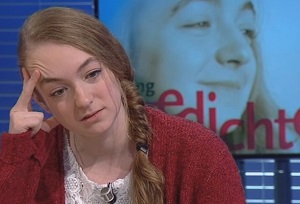
Else Kemps (Malden, 1995)
Zie voor nog meer schrijvers van de 4e februari ook mijn vorige blog van vandaag.
Zie voor bovenstaande schrijvers ook mijn blog van 4 februari 2007 en ook mijn blog van 4 februari 2008 en eveneens mijn blog van 4 februari 2009.
|



